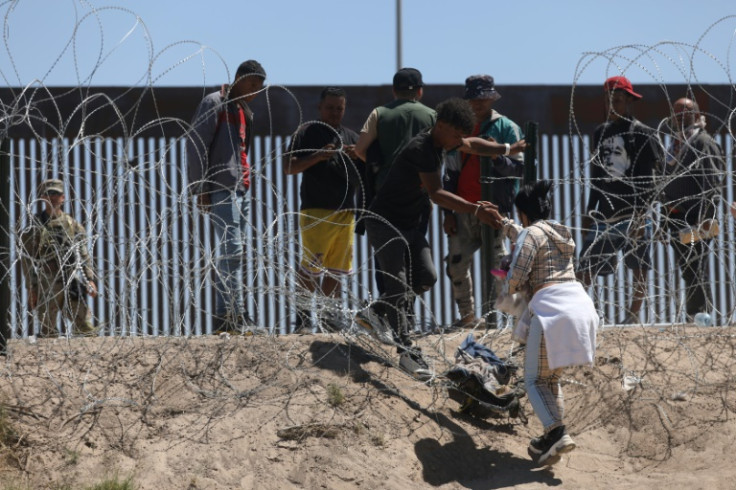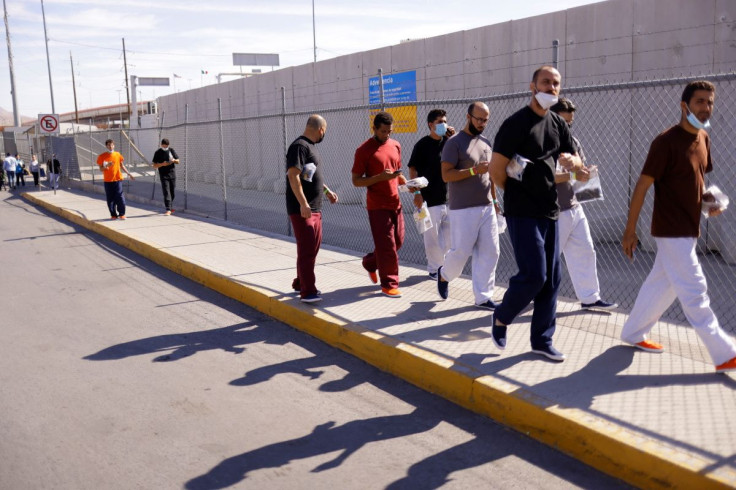Title 42 Policy End Date: What Will Happen On The Border When It Expires?

KEY POINTS
- Controversial pandemic-era border policy Title 42 is set to expire Thursday
- The government will revert to old immigration law to penalize migrants crossing illegally once Title 42 ends
- The Biden administration aims to build more migrant processing policies and implement fast-track deportation process
Title 42, the controversial Trump-era pandemic border policy that allowed officials to swiftly expel migrants at the southern border, is set to expire Thursday at 11:59 p.m. EDT, setting the stage for a more heated debate on immigration.
Officials predict a jump in the number of migrants trying to cross into the U.S. once the border policy ends and fear that it could overwhelm the immigration system.
Under Title 42, officials were allowed to skip parts of the prolonged administrative processing of migrants and return those caught entering illegally to their home countries or to Mexico quickly. Once the public health border policy expires, the government will revert to the old immigration law under Title 8 of the U.S. Code of federal statutes that prolonged the process, according to The New York Times.
Under Title 8, migrants would face penalties that were not present under Title 42. These include up to two years in prison for those who re-enter the U.S. through illegal means after having been removed or deported, according to NBC News.
Migrants removed from the country would also be prohibited from re-entering the U.S., even legally, for five years. Those caught re-entering could face felony charges, imprisonment and longer bans on re-entering the country.
Ahead of Title 42's expiration, the Biden administration had planned multiple changes to the old protocols that it hopes will relieve the pressure on the border and improve officials' response, CNN reported.
Earlier this month, the Department of Homeland Security released a six-pillar plan outlining the agency's operations post-Title 42, including establishing additional migrant processing facilities, improving transportation, and implementing a fast-track deportation process known as "expedited removal."
The government also introduced a new regulation expected to go into effect this week that would ban migrants who traveled through other countries on their way to the southern border from applying for asylum in the U.S. It would not apply to unaccompanied migrant children.
The Biden administration also plans to deploy an additional 1,500 troops to the border and pins its hope on Mexico to help curb migration.
Several border cities have already issued emergency declarations in anticipation of the end of Title 42, such as Brownsville, El Paso, and Laredo in Texas.
New York City's Democratic Mayor Eric Adams called on the federal government to provide more funding for cities welcoming migrants to handle the looming surge, Reuters reported.
As Title 42 comes to an end, the number of migrants apprehended at the border has begun to climb.
According to preliminary data provided by Brandon Judd, the president of the National Border Patrol Council, the U.S. Customs and Border Protection (USCBP) apprehended 183,000 migrants in April, a 13% increase from March.
Data from the USCBP showed that 2,825,970 migrants had been expelled from the border throughout the more than three years of Title 42 implementation.
The last fiscal year marked the highest number of apprehensions with 1,103,966, while more than 444,000 were expelled for the fiscal year 2023.
Title 42 is a part of U.S. law that deals with public health, social welfare and civil rights. The policy allowed the federal government to swiftly expel migrants at the country's land borders to "stop the introduction of communicable disease," which became the hallmark of then-President Donald Trump's declaration in March 2020 at the early stage of the COVID-19 pandemic.
The declaration of Title 42 was criticized by immigrant rights advocates, arguing that the Trump administration, known for its stricter immigration agenda and wall on the southern border, was using the pandemic as a pretext to shut immigrants out of the U.S.
The public health border policy continued under President Joe Biden's watch. The Biden administration tried to end Title 42, but Republican-led states launched legal challenges and elevated it to the Supreme Court.
As Biden signed the bill ending the COVID-19 national emergency, Solicitor General Elizabeth Prelogar told the high court that the Republicans' legal challenge was already moot.

© Copyright IBTimes 2025. All rights reserved.






















